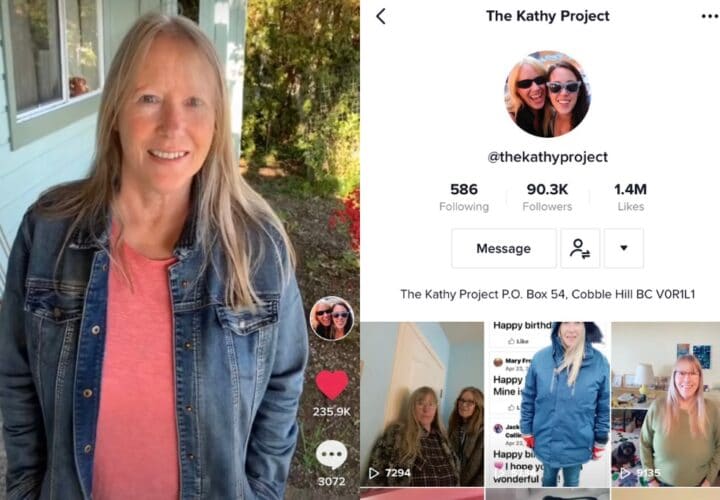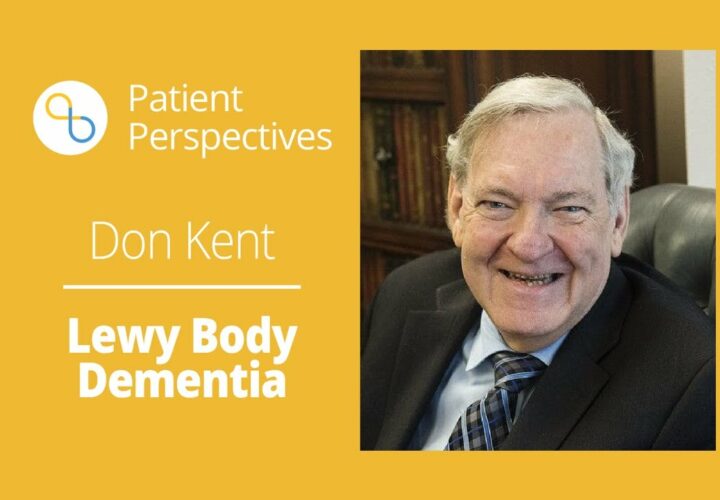The earliest signs of dementia: Five people diagnosed with neurodegenerative diseases including Alzheimer's, Lewy Body and FTD, share the moments they first knew something was not quite right.
The early indicators of Alzheimer’s disease or dementia can be subtle — at times, imperceptible to the person experiencing them. Forgetfulness or struggling with everyday life are often assumed to be “normal aging.” As symptoms gradually develop, however, often the reality of something more serious sets in. Being Patient asked five people what first prompted them to seek out care.
John Wood is an award-winning art educator who taught grades kindergarten through 12th grade for over 20 years. Wood was first diagnosed with Alzheimer’s disease in 2014 at 46 years old. About a year later, after further testing at Cleveland Clinic, that diagnosis was revised to frontotemporal dementia.
“Before 2014, at work where I was teaching at the Detroit School of Arts, I would get lost in the building. I would forget where I was supposed to be next. I tried to compensate for it with notes. I had a clipboard with my schedule on it. When you have trouble remembering, even those things don’t really help. A lot of times when I was having trouble with my memory, it was kind of like, ‘Oh, John’s just John. He forgets,’ because some of the things were pretty subtle. But when I think back on it, there were other times like when I would get lost driving.” –John Wood
Kathy Collins was diagnosed with early-onset dementia at the age of 57. She and twin sister Jean Collins decided to start a TikTok account, “The Kathy Project,” to track Kathy’s journey with dementia, helping raise awareness about dementia among tens of thousands of followers with over a million likes.
Kathy Collins: “I didn’t understand what was happening to me at first. And I would cry quite frequently and be, you know, a cry baby I guess. Lots of anxiety — tons of anxiety.”
Jean Collins: “I was shocked by her condition. She wasn’t herself. I assumed it was probably a mental health issue that she was probably having depression or whatever. You were constantly wringing your hands.
Kathy Collins: “I would do the shopping and I would forget something.”
Jean Collins: “Or she couldn’t remember her husband at the time, couldn’t remember his brand of cigarettes. Lots of repetitive behaviors, like playing Mahjong and Solitaire all day long for hours and hours, all day long.”
“Lots of repetitive behaviors, like playing Mahjong
and Solitaire all day long for hours and hours, all day long.”
Don Kent was misdiagnosed by six different neurologists before being accurately diagnosed with Lewy Body Dementia at the Mayo Clinic at the age of 64. Today, he is an advocate for others living with the disease. He told being patient about some of the early dementia symptoms he experienced:
“Looking back I can tell that my thinking became a little cloudy, even early on. But the symptoms I recognized first were two things: one, a change of personality. I didn’t notice it so much as my wife and my son noticed it, and they said, ‘What’s wrong with Dad?’ I’ve always been a sort of laid-back person, very slow to anger and relatively cool under pressure. I was a trial lawyer, so in a courtroom you have to remain that way. And all of a sudden, I had this sort of explosive personality, very angry, saying mean things to people which I had never done before. At about the same time, I also felt a loss of my sense of taste, and I say loss because to me it was a loss, but overtime I’ve learned that it’s a hallucination, a taste hallucination. Of course, with Lewy Body we can have hallucinations with all of our senses. So, for me it was a loss of a sense of taste and a rather abrupt personality change.” –Don Kent
“I’ve always been a sort of laid-back person, very slow to
anger and relatively cool under pressure. And all of a sudden,
I had this sort of explosive personality, very angry, saying
mean things to people which I had never done before.”
Eugenia Zukerman is an internationally renowned flutist, a former correspondent for CBS News Sunday Morning and the author of multiple novels, screenplays and book reviews. She was diagnosed with Alzheimer’s at 72 years old. Her daughters first noticed her early dementia symptoms:
“I’ve always had multiple things that I’m doing at the same time, and I didn’t really notice much. It was my daughters who said to me, ‘You’re not making a lot of sense,’ and I would say ‘Oh, that doesn’t matter.’ It kept going to the point where my daughter said, ‘I’m going to take you and you’re going to be tested.’ So, we got into the subway, went uptown, and I was tested. And I was very surprised at the results, because it turned out that indeed I had the early Alzheimer’s signals.
So I went through the series of tests, and I’m probably one of the only people you might know who enjoyed having the CAT scan because I loved the music. There was no fear in this, and my daughter and I got back into the subway laughing our way back to our places in the city. I went up into my apartment, I sat down at my desk, and I stared at the wall for quite a long time. And then for some reason I picked up paper and pencil and started writing.” -Eugenia Zukerman
“It was my daughters who said to me,
‘You’re not making a lot of sense.’”
Chris Schwilk, a former associate professor of special education at Shippensburg University, was diagnosed with Lewy body dementia in 2016.
“I was a university professor [who] trained special education teachers. In my teaching, preparation, grading, I could tell something was off as far back as 2014. I mentioned it to my primary care physician who’s known me for [roughly 20 years] and he said: ‘You’re probably just getting older, but let’s send you for an MRI and make sure you don’t have Alzheimer’s.’ When they sent me for an MRI and I didn’t have Alzheimer’s, I’m like: ‘Cool. Everything’s great, wonderful.’ But over the next couple of years, work just kept getting more difficult. My driving was becoming problematic. Not that I was dangerous, in fact I’m still driving right now with the blessing of my neurologist, but I began not feeling comfortable and having problems with depth perception.” –Chris Schwilk
“My driving was becoming problematic. Not that I was
dangerous, in fact I’m still driving right now with the blessing
of my neurologist, but I began not feeling comfortable
and having problems with depth perception.”
Arthena Caston previously worked in customer support for a large insurance company before getting diagnosed with early-onset Alzheimer’s at age 51. She is now one of two individuals living with dementia to serve on the Alzheimer’s Association’s Board of Directors.
“I would get lost in the building. I would
forget where I was supposed to be next.”
“I knew something was wrong because I had witnessed my father and six of his brothers and sisters either diagnosed or in the stages of early onset or Alzheimer’s disease. I knew I started having a problem when I just could not seem to get simple things right. I was doing a little bit of forgetting and things I had known forever were now all of a sudden not commonplace for me anymore. I had been working with an insurance company for over 20 years and I talked to customers everyday.
“I started having a problem when I just could
not seem to get simple things right. I had to keep
writing things down. I kept saying, ‘I should know this.
I shouldn’t have to wonder why I can’t remember.’”
Things that I knew to tell them about their coverage or insurance was basically all of a sudden not there. I had to keep writing things down. I kept saying, ‘I should know this. I shouldn’t have to wonder why I can’t remember.’ It’s something as simple as I went to work one day, got off work and had left my car running the whole eight hours in the parking lot. That was not the beginning, but near the end of when I knew something was wrong.” –Arthena Caston
Transcripts edited for clarity.





It must be really distressing to hit a point where you realise there’s a problem but not necessarily recognising exactly what the issue is, I have personally found shopping lists to be a real problem since shopping online as there’s no visual shelves to look at and so I find I forget certain items.
I am quite forgetful as well so maybe I should be asking the question.
Take care and I suppose keeping occupied is a good thing to help ease the anxiety these diseases must bring with them
My mother had Alzheimer’s disease for over six years. It was a terrible ordeal. I am now a “senior” and starting to worry about forgetfulness, misplacements, etc. I only have sons – no daughters.
I try not to let it rule my life, but I do worry about Alzheimers not so much much for myself, but for my husband. He is 70, a out the same age his mother began exhibiting symptoms. Her mother also developed Alzheimers around the same age. However, my mother in law’s sister, my husband’s aunt, never developed dementia. So, there is that.
I try to keep my eyes open to any changes in his memory, abilities and personality. He still works pretty much full time because he likes the work he does and finds it challenging and stimulating. He regularly uses a computer and does a great deal of work related reading research. And, he is still willing and able to learn new computer skills.
So, for now, I think things are going well, but I can’t help having that bit of worry in the back of my mind.
I saw how dementia took his mother and grandmother away from us when they should have had more good years ahead of them.
I hate Alzheimers with a burning rage and pray every day a cure is found.
This is a very informative article. Thank you. I am 68 and mentioned to my pcp that I was forgetting a lot. His reply, “When you find your keys in the frig, then we’ll talk.”
I left my pcp after he said to me a similar statement (and of course after I asked for a Neurologist referral). Have not regretted the change in my pcp.
I had the privilege of meeting Ms Zuckerman 2 years ago when she came to speak it Monroe Community Hospital. She is truly an inspiration and I was awestruck by her ability to power through and adjust her life to her disease. I was also inspired but how loving Leah her husband took care of her yet allowed her all the freedom know that she deserved to do the things she still could do.
She also performed a beautiful piece for us, on her flute. She signed her book for me as she did for many other people, patiently and spoke with each person. I’m very grateful fo her taking the opportunity to speak at Monroe Community Hospital, in Rochester, New York. God bless her and her family.
I’m worried my mom passed from alzheimers my sis tested positive for the gene I was told was fibro fog but not quite sure tested the paper test 4or 5 yrs ago with flying colors just dont know ugh
My mother had alzheimers and I watched her go through stages. We had to put in a nursing home. She eventually stop talking and eating. So the research and awareness is very much needed.
These articles are so helpful. Dementia is in our family. Thank you.
A trunkful of thanks from for these hints with regard to Alzheimer’s. Blessings to the folks who came forward to make one aware of the early signs.
I believe my husband has early onset dementia however I took him to a neurologist that did mri, all types of neurology test and they said no. Even got him hearing aids. The adult kids see it to.
He is not the same person.
My father had vascular dementia. I am terrified of getting any sort of test, because I’m afraid I would be too depressed to go on. How does one deal with a positive diagnosis?
My father had Lewy Body Dementia. Along with LBD he was legally blind, Essential tremors, skin cancer, 3 kidney transplants and much more. He died at 69. He was a true fighter. I am 57 and I have alot of his medical issues . I am beginning to forgot names of common things and do not remember things as good as I used to. I want to get tested for Alzheimers and dementia but don’t know how to begin. Thanks for this article. There is hope.
Go to your primary care physician. They will give you a few short tests and if they think you need it, they will give you a referral.
I’m so glad I read this article. I’ve been feeling something wrong with my memory & depth perception for 5 years. My primary care doctor said I’m just too busy! My house is covered in post-it notes from turn off a light to “Get the mail” next to the front door. Thank you for creating this organization. BTW, I’m 68.
This was a great read for me to come across. Im 45 and have been having some very questionable things happening to me that are seemingly making a little more sense now. I have long history of both diseases in my maternal family and I will now talk about these things to my physician with more urgency than I may have before these articles. So to the one that published this article i say a big thanks
At 64, after being the primary caregiver for my mother, who was diagnosed with Alzheimer’s, I’m acutely aware of the most minute changes in my memory or behavior. The is it dementia question is always lurking in the back of my mind so this article was very helpful.
I know that I’m not “me” any more. Or, rather, the me I used to be. My short term memory is nearly non exsistant, my long term memory is better but I’ve noticed increasing difficulty there as well, there are some personality changes where my anger is out of control sometimes which has normally not been an issue. The neurologist I am seeing about RLS, gave me a brief exam where I was required to memorize 3 words twice and repeat them later in the exam. Both times I missed a word (different one each time, though they were the exact same words just in a different order). A year ago, when I tested myself with the SAGE? test, I could remember all four. Now I can’t remember 3 words. Will have to seek another opinion, I guess.
Thank you for coming out about Dimensia and Alzheimers. My grandma had dementia and my mom was diagnosed with Dimensia. I am 55 years old and I am having problems with remembering things. I also got lost a few times while I was driving. I told my doctor about my issue and she said we will keep track of how often this happens, also I find myself crying quite frequently, so I was thinking I have depression. I also have Hypothyroidism. I use to be a really good speller and a lot of times I can’t remember how to spell words. I have to sound it out and take it slow.
These articles & comments disturb me since I’m about to turn 65 and have depth perception fails with stairs lately. Would like to know if non-pharmaceutical protocols/treatments have been successful for people who’ve been diagnosed
Thank you for this article.
To People Who Responded: MRIs are designed to detect masses not subtle atrophy. Ask your doctor for other scans.
Even without scans, informed doctors can observe and conduct a series of simple tests which then sound the alarm. The best one, however, is to listen to the patient, or if the patient has lost self-awareness, to the family member who brought the patient kicking and screaming in.
If you have problems with depth perception then get it checked out.
You know yourself better than your doctor does. If your doctor dismisses or downplays your concerns, seek another opinion.
My last comments are to people whose family member is entirely unaware that something is very wrong: Stay calm, focused and strong. Others who don’t live in your household have no idea what you are seeing and experiencing.
Go to your primary care physician. They will give you a few short tests and if they think you need it, they will give you a referral.